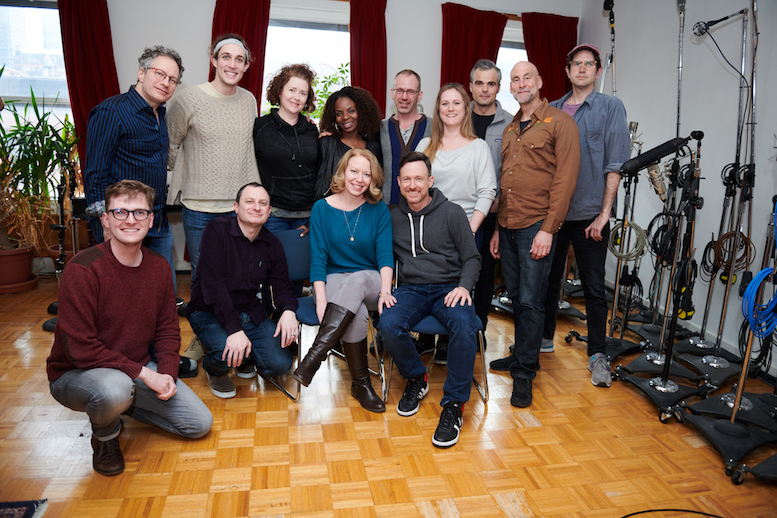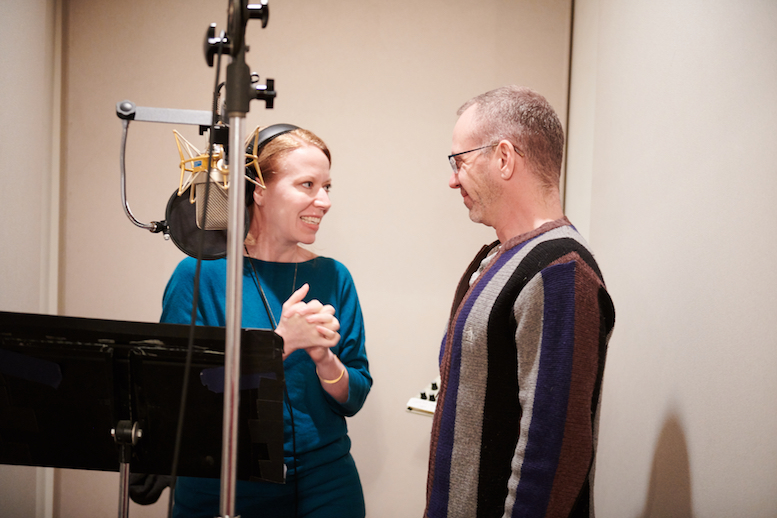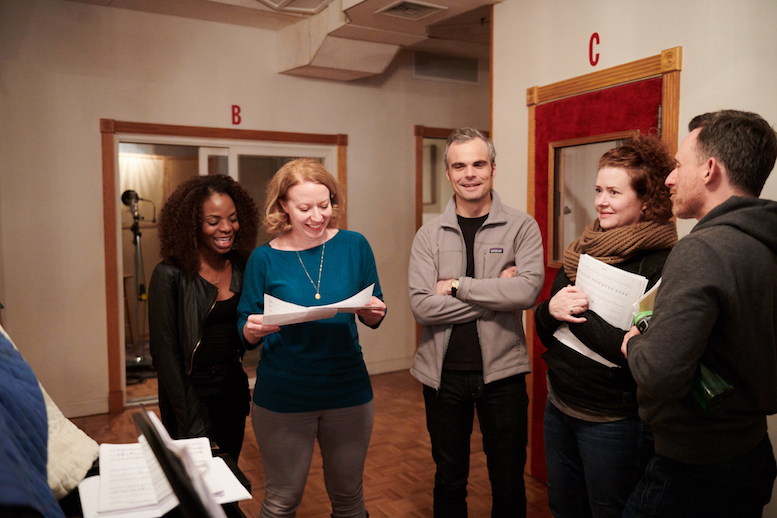Two-Part Names & Other Joys: An Interview with Faith Zamblé
The Civilians' Resident Dramaturg Phoebe Corde sits down (virtually) with Extended Play editor Faith Zamblé to talk dramaturgy, research, and more.
Sign up to get spam-free email updates to ensure you never miss an article and to receive exclusive details about performances and events from The Civilians.
 In the recording studio for This Beautiful City. Left to right, front row: Wiley Deweese, Dan Lipton, Emily Ackerman, Brad Heberlee. Back row: Chris Biesterfeldt, Conor Ryan, Alison Weller, Marsha Stephanie Blake, Steve Cosson, Amy Ashton, Stephen Plunkett, Richard Huntley, Benjamin Campbell. Photo credit: Jenny Anderson
In the recording studio for This Beautiful City. Left to right, front row: Wiley Deweese, Dan Lipton, Emily Ackerman, Brad Heberlee. Back row: Chris Biesterfeldt, Conor Ryan, Alison Weller, Marsha Stephanie Blake, Steve Cosson, Amy Ashton, Stephen Plunkett, Richard Huntley, Benjamin Campbell. Photo credit: Jenny AndersonIn the summer of 2019, ten singers gathered in a recording studio to record This Beautiful City, a musical that had first premiered over a decade earlier. The recording is one of the nine albums that comprise The Michael Friedman Collection, three of which are available now. The Collection is funded by the Michael Friedman Legacy Fund, with the goal of celebrating and preserving The Civilians’ founding company member Michael Friedman’s artistic legacy. I got the chance to talk to four members of the original cast of This Beautiful City, to hear their reflections on the process of creating the show and ask them what it was like to record the album together.

Emily Ackerman and Steve Cosson in the recording studio for This Beautiful City. Photo credit: Jenny Anderson
In 2007, composer Michael Friedman, writer/director Steve Cosson, writer Jim Lewis, and actors Emily Ackerman, Marsha Stephanie Blake, Brad Heberlee, Stephen Plunkett and Alison Weller went to Colorado Springs, the unofficial capital of the Evangelical movement. At the time, the city’s religious and secular communities were at war over a statewide proposition to legalize gay marriage. With the support of Colorado College, the company spent several weeks there. The group, along with a class of students, met with a broad cross-section of residents from fundamentalist “spiritual warriors” to ardent atheists, observed numerous church services and interviewed more than 150 community members. “It was kind of a life-changing experience,” Weller recalls. “I think for most of us, certainly for me, it was the first time that I had been in deep conversation with people who really had this separate set of beliefs than I do. Trying to put myself aside to listen well while we were there was very intense and rewarding and inspiring.” In general, the company was welcomed into the community. “We were very upfront about what we were there to do, and, for the most part, the people of Colorado Springs were very open and willing to talk to us,” Heberlee remembers. “That was a huge discovery for me. People want to be heard, and I think if you approach somebody with openness and with transparency, people are willing to talk to you.” I asked the company whether, in a country that has only gotten more polarized since 2007, an Evangelical community would receive a group of New Yorkers with the same level of openness today. However, the cast all agreed that they would. “I think if you, the person asking the questions, seem open and like you really want to hear someone’s honest perspective and are really interested in trying to then relay that honestly yourself, then I think people are very eager to talk,” Plunkett hypothesizes. “One thing I’ve learned, that the Civilians really thrive on, is that people are just dying to talk about themselves. If you give them an opportunity, they will go and go and go.”
During the trip, the news broke that Ted Haggard, megachurch pastor and champion of the Evangelical movement, had been paying for sex from a male masseur, Mike Jones, and obtaining crystal meth from him. That Sunday, the company went to Haggard’s church. “It was pandemonium,” Plunkett recalls. “Everyone was crying and tearing their hair, and just all kinds of crazy, Greek tragedy-level mourning.” At the end of their visit, the ensemble had the daunting task of taking the material they had gathered so far and performing something that captured the varied perspectives of this troubled community. Emily Ackerman describes the intense pressure: “We had about three seconds to put together a whole show for literally every single person that we had interviewed. The environment was very polarized between the Evangelical community and the non-Evangelical community who felt oppressed, and we had no idea what was going to happen. It was incredibly intense. We didn’t know if there would be threats, if there would be fights, it was a lot. We were sleep deprived, working all day and night, memorizing everything, and we pulled it off. In the end it was beautiful. The community had a talkback and was very loving to each other.” In fact, the performance was so successful that at least one person reached out and asked if they could be included, too. “This guy sought The Civilians out because he wanted to be seen, and he wanted to be heard, and he wanted his voice in our narrative,” Heberlee explains. “I thought that was really cool, because it made me feel like we were really representing people’s points of view honestly and respectfully, which was so important to us.”

Marsha Stephanie Blake, Emily Ackerman, Stephen Plunkett, Alison Weller, and Brad Heberlee around the piano, rehearsing a song from This Beautiful City. Photo credit: Jenny Anderson
The score that was recorded this summer had changed quite a bit since that scrappy performance in Colorado Springs twelve years before. “We remembered parts of songs that never made it into the show, or that made it into one iteration and then went away,” Weller says. “We were talking about different versions of things in the room, like, ‘oh no, that was the verse we did that was cut in California.’” But it didn’t take the group long to pick up where they left off. “It’s one of those things where we’re forever bonded,” Heberlee explains. “The songs are still in my body.” Weller agrees: “It’s always lovely to see that group of people. It always feels a little bit like no time has passed, but also so many very big things happened since we did the show, it also seems like so much time has passed.” For the ensemble, their reunion brings both joy and grief. “It really takes you right back to that time,” Plunkett explains. “And it of course made me think of Michael a lot. The music is so… it’s just so Michael. It made him feel really present, and that reminded everyone that he’s gone.” Ackerman adds, “It felt strange to be there without Michael running around and waving his arms and giving everyone notes.” Describing the characteristics of a Michael Friedman song, Plunkett says, “He had such a distinctive sense of humor, like a quirkiness, and a way of using people’s speech patterns and unintentional little verbal things as music and as part of the delightfulness of listening to a narrative expressed through a song.” In This Beautiful City, Michael’s remarkable capacity for insight is on full display. “Michael was such a genius,” Ackerman says. “Not only would he take the interview and make a song out of it, but he would perfectly capture the essence of the interviewee. Their tone, the meaning they meant to convey through what they were saying, and all of the underlying emotion. He was masterful at seeing right to the heart of someone and then turning it into a song.” For Michael’s collaborators, it was especially exciting when he applied his talents to one of their interviews, as Ackerman explains: “We never knew which character would move him into writing a song, so when he would show up to rehearsal with a song for the person you had interviewed, it was such an honor.”
Being a part of the Michael Friedman Recording Project is emotional for the whole ensemble. “It’s very bittersweet,” Ackerman reflects. “I am of course honored to be a part of the recording project, but everything in me wishes we didn’t have to do it. I wish he was still here creating music. But, of course, it is remarkable how much he was able to create and his voice was so special and unique.” “It was great that such great musicians were there, and really lovely to see his legacy is being preserved,” notes Weller. “I’m really grateful for that.” Ackerman concurs: “He gave us all so much. His legacy being preserved is very simply the right thing to do.”